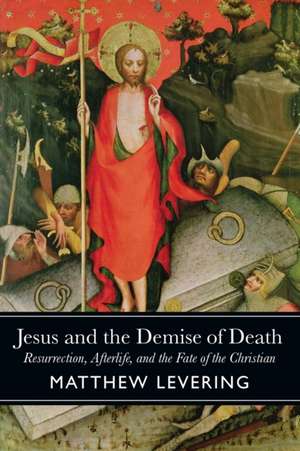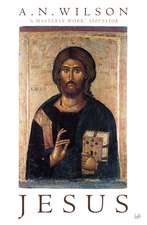Jesus and the Demise of Death: Resurrection, Afterlife, and the Fate of the Christian
Autor Matthew Leveringen Limba Engleză Paperback – 31 mar 2012
Preț: 272.23 lei
Nou
Puncte Express: 408
Preț estimativ în valută:
52.10€ • 54.19$ • 43.01£
52.10€ • 54.19$ • 43.01£
Carte tipărită la comandă
Livrare economică 14-28 aprilie
Preluare comenzi: 021 569.72.76
Specificații
ISBN-13: 9781602584471
ISBN-10: 1602584478
Pagini: 240
Dimensiuni: 152 x 228 x 14 mm
Greutate: 0.33 kg
Ediția:New.
Editura: Baylor University Press
Colecția Baylor University Press (US)
ISBN-10: 1602584478
Pagini: 240
Dimensiuni: 152 x 228 x 14 mm
Greutate: 0.33 kg
Ediția:New.
Editura: Baylor University Press
Colecția Baylor University Press (US)
Recenzii
"Levering brings the best of current biblical scholarship into a creative interface with theological reflection informed by one of the Church's greatest minds, Thomas Aquinas. In Jesus and the Demise of Death the core tenets of classical Christian eschatology, recently jettisoned by many theologians as allegedly outdated, make a surprising and come-back. Levering adds an important and timely Catholic contribution to the lively contemporary theological debate about Christian eschatology." --Reinhard Huetter, Professor of Christian Theology, Duke University Divinity School
"In an investigation that hides its great learning, Levering argues for a realist understanding of the biblical account of the resurrection of Jesus. Levering has all along being constituting himself a Catholic biblical theologian of rare talent; here, one can't help thinking of Benedict XVI as a model. It is impossible not to be struck by a similarity of style: irenic yet confident, definite but luminously and persuasively modest." --Cyril O'Regan, Huisking Professor of Theology, University of Notre Dame
" Jesus and the Demise of Death is a powerful exploration of the Christian faith's answers to one of the most fundamental human questions: What happens after I die? Following the guidance of Thomas Aquinas and others, Matthew Levering shows that there is deep wisdom in the church's traditional answers, and that this wisdom is both biblically sound and consistent with scientific discoveries about the human person." --C. Stephen Evans, University Professor of Philosophy and Humanities, Baylor University
"Faced with the finally unavoidable question of death, many in the contemporary Western world have no better answers to share than agnosticism, professed indifference, or despair. In this iconic book, Matthew Levering maps the road to a recovery of the hope that the historic Christian faith was able to offer and maintain through the story of Jesus and the personally engaged God present therein. The passage of Christ through life, death and resurrection has opened the way for countless believers over the centuries, and the divine invitation to a shared and enjoyed eternity still beckons." --Geoffrey Wainwright, Cushman Professor of Christian Theology, Duke Divinity School
...Levering underscores the hope in eternal life for Jesus' followers and gives readers firmand fruitful soil upon which to base conversations about the Christian's future. -- Theological Book Review
Matthew Levering is to be warmly congratulated on at least two fronts: for addressing a neglected aspect of the New Testament theology and for attempting to build on these biblical foundations to establish a theology of death that will inform contemporary faith and practice. -- Alan Le Grys -- Journal for the Study of the New Testament
"In an investigation that hides its great learning, Levering argues for a realist understanding of the biblical account of the resurrection of Jesus. Levering has all along being constituting himself a Catholic biblical theologian of rare talent; here, one can't help thinking of Benedict XVI as a model. It is impossible not to be struck by a similarity of style: irenic yet confident, definite but luminously and persuasively modest." --Cyril O'Regan, Huisking Professor of Theology, University of Notre Dame
" Jesus and the Demise of Death is a powerful exploration of the Christian faith's answers to one of the most fundamental human questions: What happens after I die? Following the guidance of Thomas Aquinas and others, Matthew Levering shows that there is deep wisdom in the church's traditional answers, and that this wisdom is both biblically sound and consistent with scientific discoveries about the human person." --C. Stephen Evans, University Professor of Philosophy and Humanities, Baylor University
"Faced with the finally unavoidable question of death, many in the contemporary Western world have no better answers to share than agnosticism, professed indifference, or despair. In this iconic book, Matthew Levering maps the road to a recovery of the hope that the historic Christian faith was able to offer and maintain through the story of Jesus and the personally engaged God present therein. The passage of Christ through life, death and resurrection has opened the way for countless believers over the centuries, and the divine invitation to a shared and enjoyed eternity still beckons." --Geoffrey Wainwright, Cushman Professor of Christian Theology, Duke Divinity School
...Levering underscores the hope in eternal life for Jesus' followers and gives readers firmand fruitful soil upon which to base conversations about the Christian's future. -- Theological Book Review
Matthew Levering is to be warmly congratulated on at least two fronts: for addressing a neglected aspect of the New Testament theology and for attempting to build on these biblical foundations to establish a theology of death that will inform contemporary faith and practice. -- Alan Le Grys -- Journal for the Study of the New Testament
Cuprins
Acknowledgments Introduction Part I The Passage of Jesus Christ 1 Christ's Descent into Hell 2 The Resurrection of Jesus Christ 3 Sitting at the Right Hand of the Father Part II The Passage of Christ's People 4 A People in Passage: Faith, Eucharist, Almsgiving 5 Can We Merit Eternal Life? 6 Do We Have Spiritual Souls? 7 Bodily Resurrection and Beatific Vision Conclusion Notes Works Cited Index













